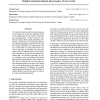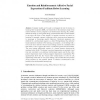752 search results - page 92 / 151 » Multiagent simulation of learning environments |
130
click to vote
UAI
2000
15 years 3 months ago
2000
Cooperative games are those in which both agents share the same payoff structure. Valuebased reinforcement-learning algorithms, such as variants of Q-learning, have been applied t...
115
click to vote
ICML
1990
IEEE
15 years 6 months ago
1990
IEEE
Given an adequate simulation model of the task environment and payoff function that measures the quality of partially successful plans, competition-based heuristics such as geneti...
112
click to vote
ICML
2008
IEEE
16 years 3 months ago
2008
IEEE
We consider the task of reinforcement learning in an environment in which rare significant events occur independently of the actions selected by the controlling agent. If these ev...
162
click to vote
AIHC
2007
Springer
15 years 8 months ago
2007
Springer
Computer models can be used to investigate the role of emotion in learning. Here we present EARL, our framework for the systematic study of the relation between emotion, adaptation...
132
Voted
ICRA
2008
IEEE
15 years 9 months ago
2008
IEEE
— Simulation is frequently used in the study of multi-agent systems. Unfortunately, in many cases, it is not necessarily clear how faithfully the details of the simulated model r...


